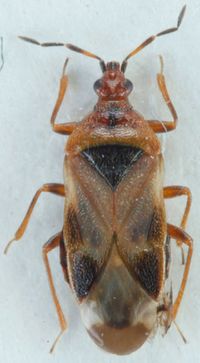Difference between revisions of "Anthocoris nemoralis (predator)"
From Pestinfo-Wiki
(Created page with "{{Taxinfo|Anthocoris (genus - predators)}} {{LiteratureDB1|{{PAGENAME}}|browse,hostsP}} <font color="#008000">'''''Anthocoris nemoralis'' (predator)'''</font> Fabricius<br/> a...") |
|||
| (6 intermediate revisions by the same user not shown) | |||
| Line 1: | Line 1: | ||
| − | {{ | + | {{TaxLinks|LnkAnthocoris}} |
{{LiteratureDB1|{{PAGENAME}}|browse,hostsP}} | {{LiteratureDB1|{{PAGENAME}}|browse,hostsP}} | ||
| − | <font color="#008000">'''''Anthocoris nemoralis'' (predator)'''</font> Fabricius | + | [[File:Anthocoris nemoralis BOLDSystems.jpg|200px|thumb|''Anthocoris nemoralis'' (click on image to enlarge it)<br/>Author: Marko Mutanen, University of Oulu<br/>Source: [http://boldsystems.org/index.php/Taxbrowser_Taxonpage?taxon=Anthocoris+nemoralis BOLD Systems]]] |
| − | + | <font color="#008000">'''''Anthocoris nemoralis'' (predator)'''</font> (Fabricius, 1794) | |
| − | + | This small bug is an important predator of psyllids (e.g. see [[Biocontrol Science and Technology (2004) 14, 811-821|Shaltiel & Coll, 2004]]) and is produced commercially. The species is native to Europe and the Mediterranean region where it lives on trees and shrubs infested with psyllids and other soft-bodied insects. It has been introduced into North America in the 1960s against the pear psyllid (''[[Cacopsylla pyri]]'') and is now widely distributed there ([[American Entomologist (2004) 50, 18-30|Horton et al., 2004]]). | |
[[Category:Anthocoris (genus - predators)]] | [[Category:Anthocoris (genus - predators)]] | ||
Latest revision as of 10:34, 27 August 2018
| Literature database |
|---|
| 36 articles sorted by: |
| • year (recent ones first) |
| • research topics |
| • countries/regions |
| • list of pest species |

Anthocoris nemoralis (click on image to enlarge it)
Author: Marko Mutanen, University of Oulu
Source: BOLD Systems
Author: Marko Mutanen, University of Oulu
Source: BOLD Systems
Anthocoris nemoralis (predator) (Fabricius, 1794)
This small bug is an important predator of psyllids (e.g. see Shaltiel & Coll, 2004) and is produced commercially. The species is native to Europe and the Mediterranean region where it lives on trees and shrubs infested with psyllids and other soft-bodied insects. It has been introduced into North America in the 1960s against the pear psyllid (Cacopsylla pyri) and is now widely distributed there (Horton et al., 2004).